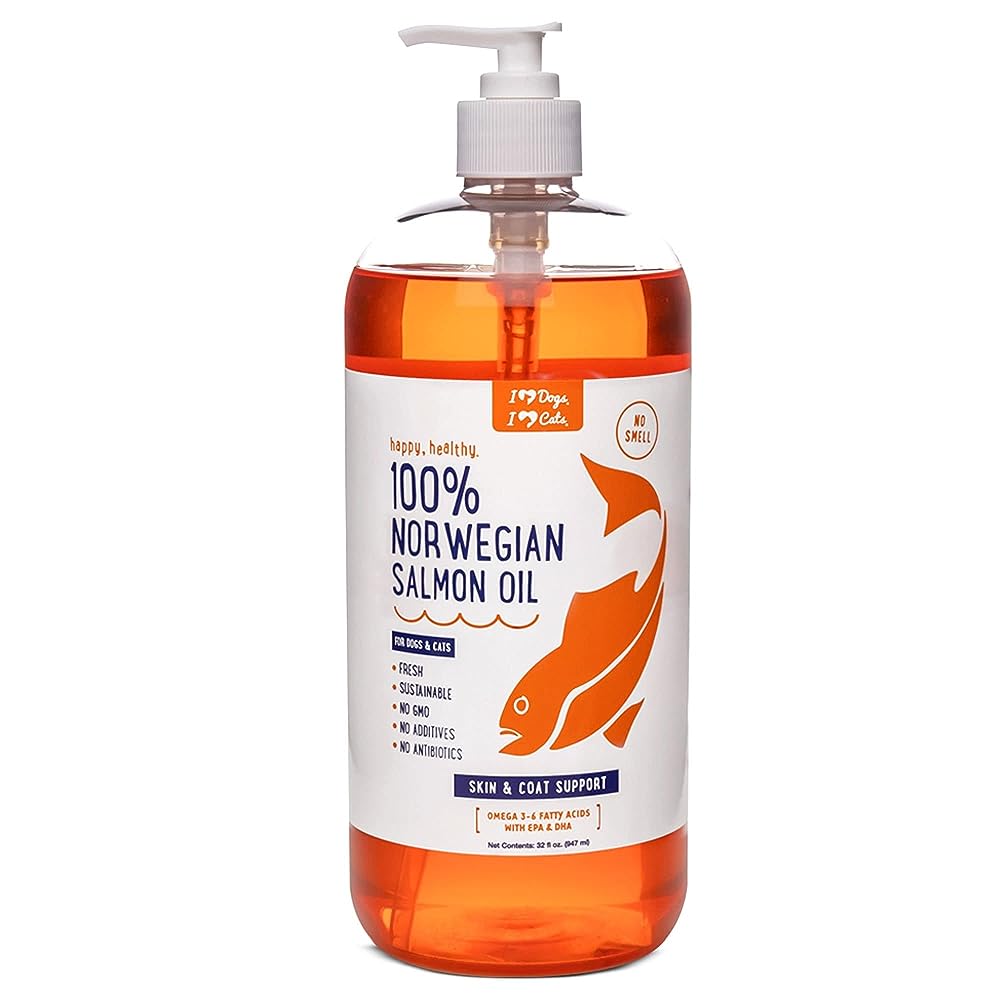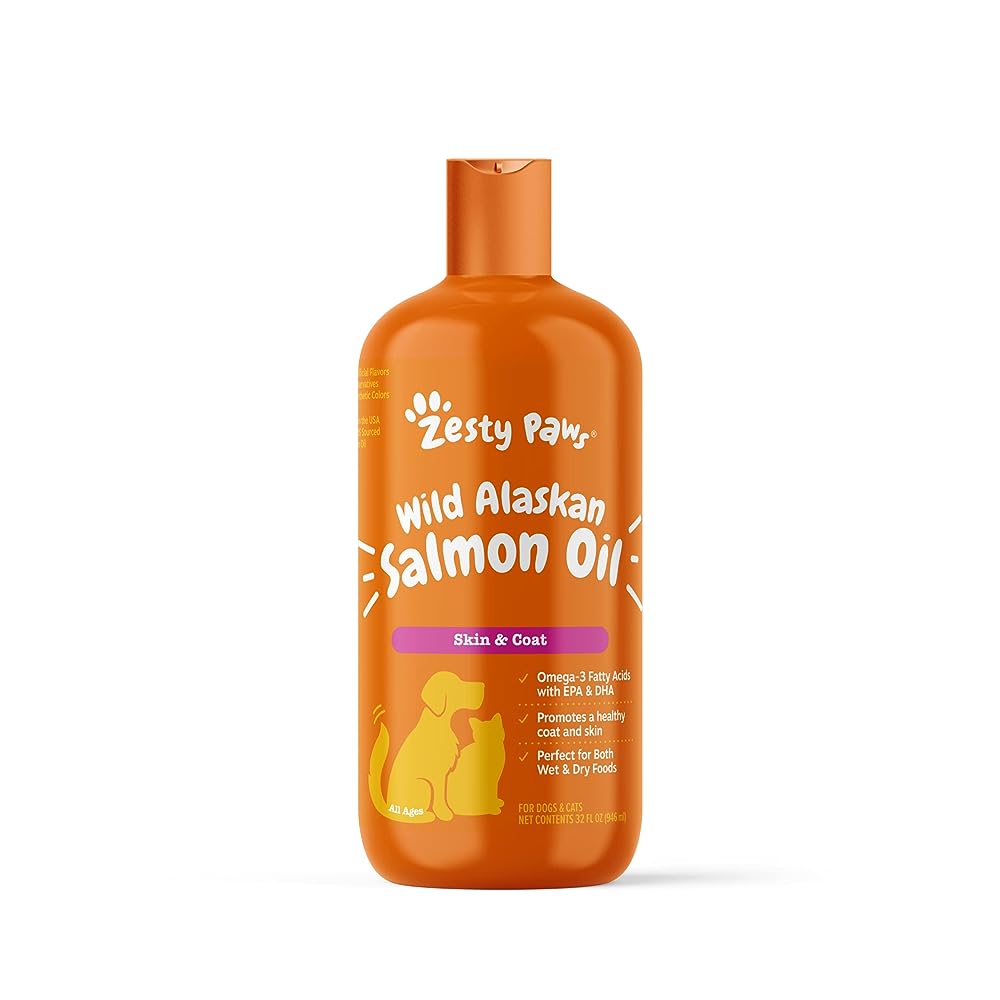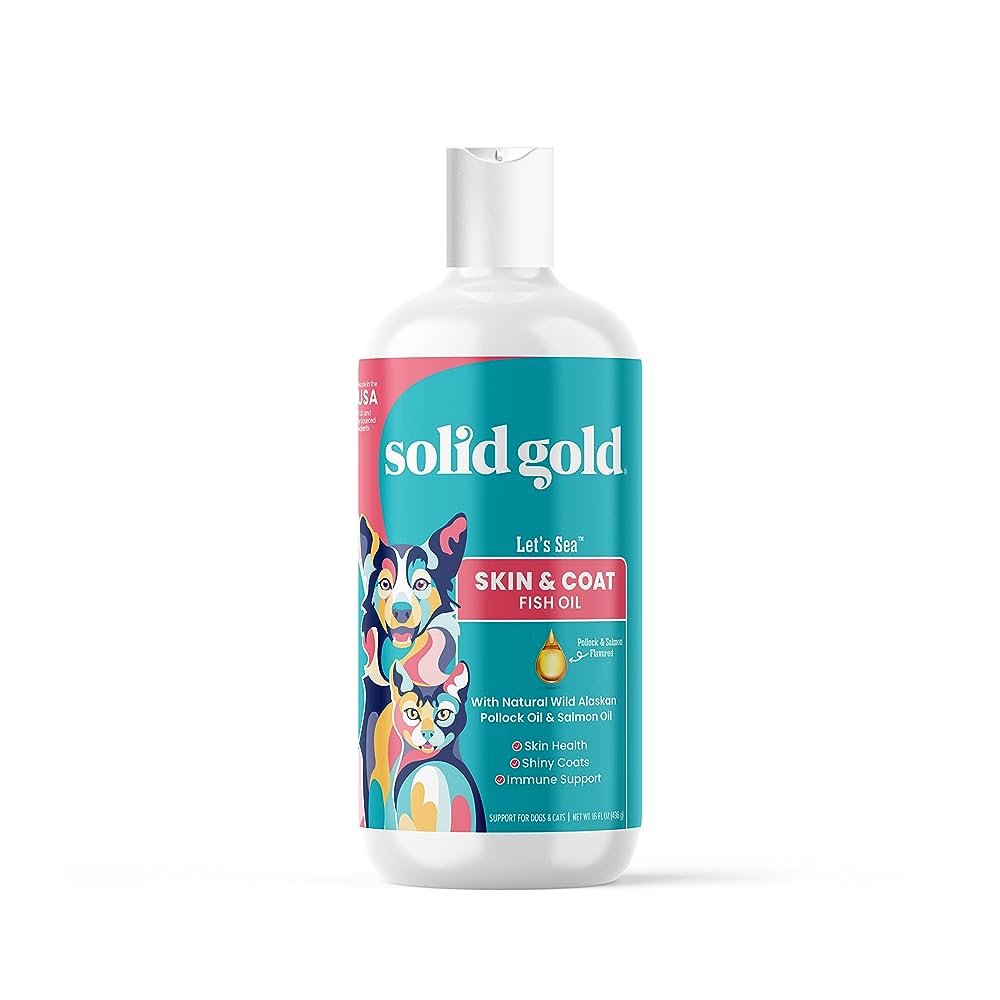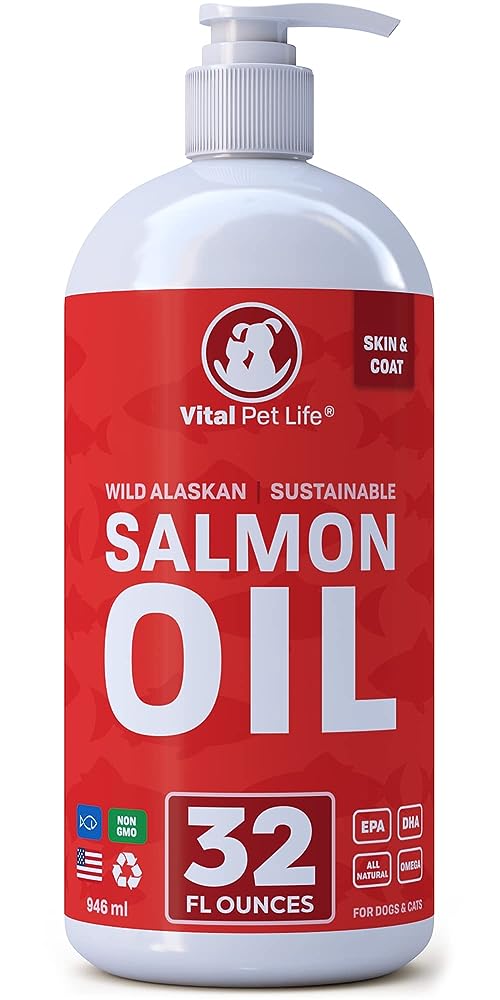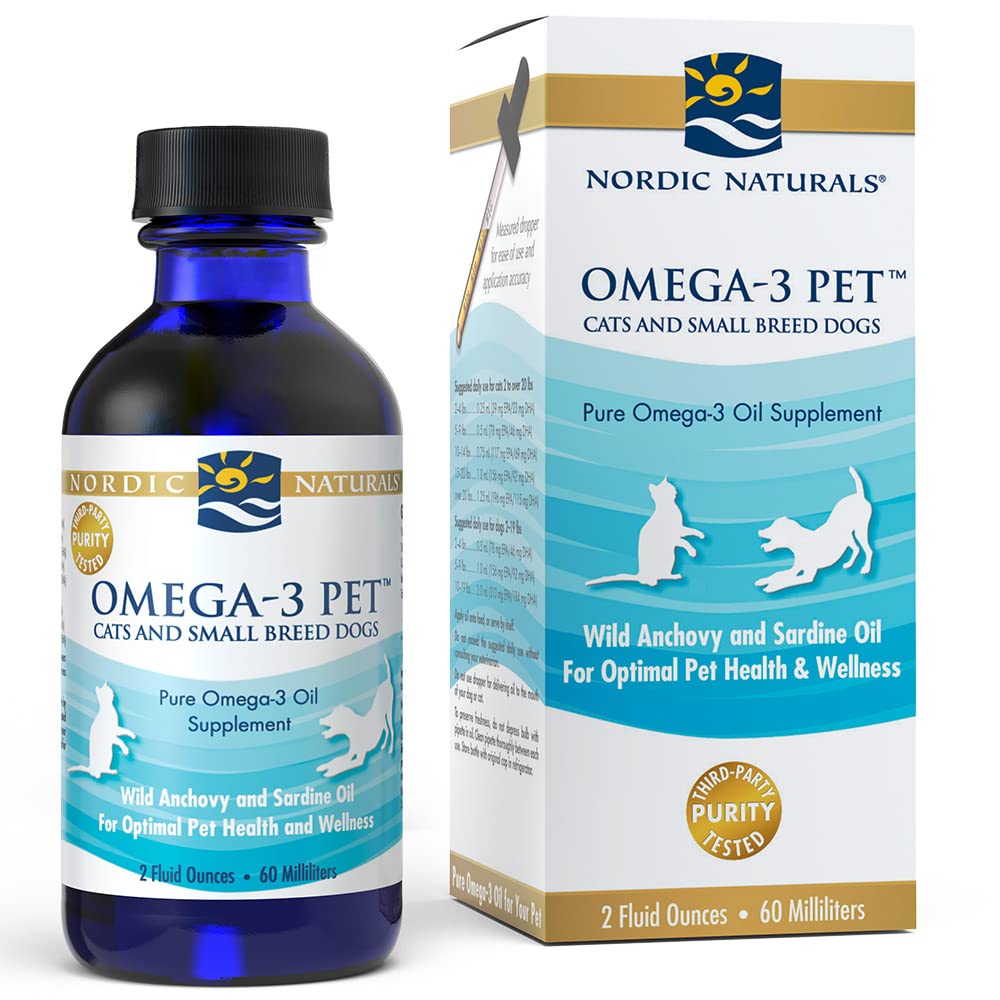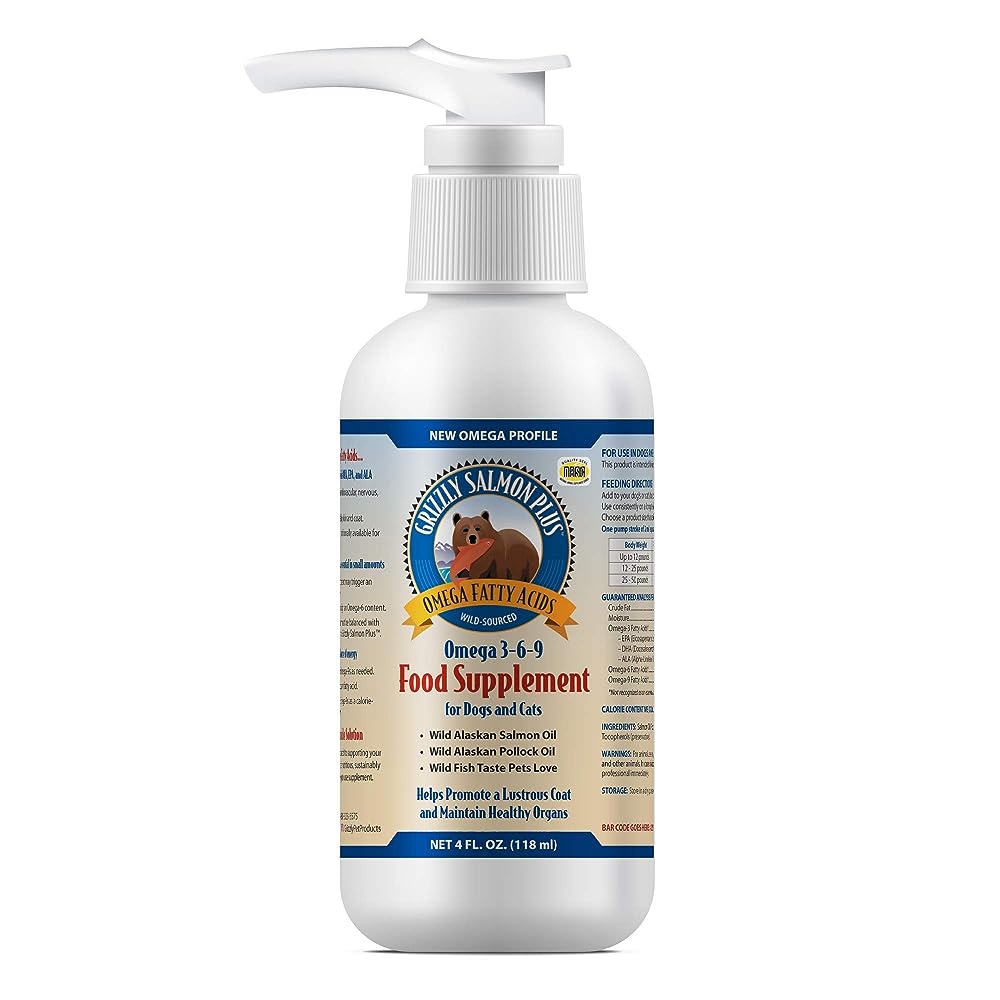iHeartCats is reader-supported. When you buy via links on our site, we may earn an affiliate commission at no extra cost to you.
In the world of feline health and nutrition, there’s a rising awareness about the importance of essential fatty acids, particularly Omega-3s, for maintaining optimal health. Known for their powerful anti-inflammatory and heart health benefits, Omega-3s are vital for cats of all ages and health statuses. In this article, we will explore the best Omega-3 supplements for cats, delving into their potential benefits, different forms, and how to choose the best product for your feline companion.
#1 – iHeartDogs Salmon Oil for Dogs and Cats – Nourishing Skin & Coat Omega 3 Fish Oil for Dogs Supports Allergy & Itch Relief, Heart Health and Joint Health – 32 oz
The iHeartDogs Salmon Oil is a single-ingredient omega fatty acid source that supports a healthy immune system, heart health, joint health, and healthy skin and coat for dogs and cats. It provides dynamic health support, including relief from allergies and itchy skin, and aids in pain and mobility support. The salmon oil is sustainable, fully traceable, and made without GMOs, antibiotics, preservatives, or other additives.
Best For: Nourishing skin and coat, allergy relief, and joint health support. (Best overall)
#2 – Pure Wild Alaskan Salmon Oil for Dogs & Cats – Omega 3 Skin & Coat Support – Liquid Food Supplement for Pets – Natural EPA + DHA Fatty Acids for Joint Function, Immune & Heart Health, 32 Fl Oz
Pure Wild Alaskan Salmon Oil is a liquid food supplement for dogs and cats. It is rich in Omega-3 fatty acids, including EPA and DHA, which support joint function, immune health, and heart health. This oil nourishes the skin and coat, keeping them in optimal condition.
#3 – Solid Gold Fish Oil for Dogs & Cats – Wild Alaskan Salmon Oil for Dogs Skin and Coat Support – Omega 3 Pollock Oil Blend and Fatty Acids with EPA & DHA for Immune System Health – 16 oz Bottle
The Solid Gold Fish Oil for Dogs & Cats is a salmon oil supplement that provides nourishment for pets through a blend of natural, wild-caught Alaskan salmon oil and pollock oil. It promotes healthy skin and coats by containing omega-3 fatty acids (EPA and DHA). Additionally, it supports immune system health and can be easily added to wet or dry food.
#4 – Salmon Oil for Dogs & Cats – Healthy Skin & Coat, Fish Oil, Omega 3 EPA DHA, Liquid Food Supplement for Pets, All Natural, Supports Joint & Bone Health, Natural Allergy & Inflammation Defense, 32 oz
This 32 oz. bottle of salmon oil is a natural and liquid food supplement for dogs, cats, and other pets. It contains essential omega 3 fatty acids that support healthy skin and coats, as well as provide allergy defense and joint and bone health benefits. The salmon oil is sustainably sourced and the product is made in the USA.
Best For: Healthy skin, allergy defense, and joint health.
#5 – Zesty Paws Salmon Omega Oil Hemp for Dogs and Cats with Wild Alaskan Salmon Oil Omega 3 and 6 Fatty Acids with EPA DHA for Pets Supports Normal Skin Moisture and Immune System Function 16oz
Zesty Paws Salmon Omega Oil Hemp is a pet supplement that combines wild Alaskan salmon oil and hemp seed oil to support skin health and immune function in dogs and cats. It contains Stearidonic acid (SDA), a precursor to long-chain fatty acids, which may support immune function in pets. The product also includes premium wild-caught Alaskan salmon fish oil with Omega-3 fatty acids (EPA and DHA) for skin health.
Best For: Supporting skin health and immune function in pets.
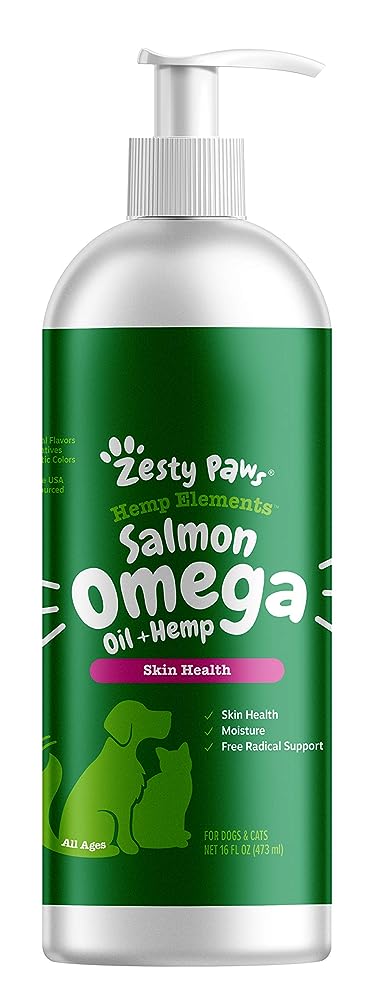
#6 – Nordic Naturals Omega-3 Pet, Unflavored – 2 oz – 304 mg Omega-3 Per One mL – Fish Oil for Small Dogs & Cats with EPA & DHA – Promotes Heart, Skin, Coat, Joint, & Immune Health
The Nordic Naturals Omega-3 Pet is a high-quality fish oil supplement specially formulated for cats and small breed dogs. It contains omega-3 fatty acids EPA and DHA, which have been shown to support heart, skin, coat, immune, and joint health in pets. The fish oil is sourced from fresh, wild-caught fish and is made without artificial colors, flavors, or preservatives.
Best For: Promoting heart, skin, coat, joint, and immune health in pets.
#7 – Grizzly Salmon Oil Cat Food Supplement Omega 3 Fatty Acids, 4 oz
The Grizzly Salmon Oil Cat Food Supplement is a 4 oz bottle that provides an abundance of omega 3 fatty acids to support various aspects of a cat’s health. Made from certified wild caught Alaskan salmon, the supplement helps nourish the immune system, heart, organ health, cognition, vision, fertility, nerve functions, and promotes a healthy skin and coat. The product is made by Grizzly, a trusted brand with a unique leadership and commitment to quality ingredients and production processes.
Best For: Nourishing a cat’s overall health and promoting a healthy skin and coat.
What’s Important When Choosing an Omega-3 for My Cat?
Choosing the right Omega-3 supplement for your cat involves several important considerations:
- Source of Omega-3: The source of the Omega-3 fatty acids is crucial. Fish oils, like salmon, mackerel, sardines, or krill, are generally the best sources. Algal oil, derived from algae, is a good vegetarian alternative.
- DHA and EPA content: Look for supplements that clearly list the amounts of DHA (docosahexaenoic acid) and EPA (eicosapentaenoic acid), two types of Omega-3 that are particularly beneficial for cats. These fatty acids support brain function, vision, and joint health, among other benefits.
- Purity and Quality: The supplement should be free of contaminants like heavy metals, PCBs, and dioxins. Many reputable manufacturers will have their products independently tested for purity and potency and will provide a certificate of analysis.
- Form of Supplement: Omega-3 supplements for cats come in various forms such as liquid, soft gels, or chews. Choose a form that is easiest for you to administer and most appealing to your cat.
- Dose: Ensure the supplement provides an appropriate dose for your cat’s weight. It’s best to consult with your veterinarian to determine the optimal dosage.
- Additional Ingredients: Some supplements may include additional beneficial ingredients like vitamin E, a natural antioxidant that helps protect the body from the effects of oxidative stress. However, be wary of unnecessary additives or fillers.
- Brand Reputation: Lastly, consider the reputation of the brand. Look for companies that are transparent about their ingredients and manufacturing processes, and that have positive customer reviews.
Remember to always consult with your veterinarian before starting any new supplement regimen.
What Are The Benefits of Omega-3 Fish Oil for Cats?
Omega-3 fish oil offers a multitude of health benefits for cats:
- Promotes Heart Health: Omega-3 fatty acids, particularly EPA and DHA, support heart health by improving blood flow, reducing blood pressure, and helping maintain a regular heart rhythm.
- Improves Joint Health: Omega-3s are well-known for their anti-inflammatory properties. This can greatly benefit cats suffering from arthritis or other inflammatory joint conditions, improving mobility and reducing discomfort.
- Supports Skin and Coat Health: Regular intake of Omega-3s can help alleviate skin allergies, reducing itchiness and inflammation. It also promotes a shiny, healthy coat.
- Aids Cognitive Function: DHA, a type of Omega-3, plays a crucial role in brain and eye development in kittens and helps maintain cognitive function in older cats.
- Boosts Immune System: Omega-3 fatty acids are known to enhance the immune system, helping your cat fight off illness and recover more quickly.
- Supports Kidney Health: Some research suggests that Omega-3s may slow the progression of kidney disease, a common issue in older cats.
Remember, while Omega-3 fish oil supplements can provide these benefits, it’s important to choose a high-quality product and consult with your veterinarian before starting any new supplement regimen. Your vet can provide specific guidance based on your cat’s unique needs and circumstances.
Frequently Asked Questions About Omega-3 Fish Oils for Cats
- What are Omega-3 fatty acids? Omega-3 fatty acids are essential nutrients that play a crucial role in maintaining your cat’s overall health. They are called “essential” because the body cannot produce them, meaning they must be obtained through diet or supplements.
- Why should my cat take Omega-3 supplements? Omega-3 supplements can benefit cats in many ways, including supporting heart and joint health, promoting a shiny coat and healthy skin, improving cognitive function, boosting the immune system, and potentially slowing the progression of kidney disease.
- What are the sources of Omega-3 for cats? The best sources of Omega-3 for cats are fish oils, like salmon, mackerel, or sardines. Algal oil, derived from algae, is a vegetarian source. These oils are rich in DHA and EPA, the two types of Omega-3 that offer the most benefits for cats.
- How do I choose a good Omega-3 supplement for my cat? Look for a supplement that clearly lists the amounts of DHA and EPA, comes from a reputable source, is free of contaminants, and is in a form your cat will accept. Always consult your vet before starting any new supplement.
- Can I give my cat Omega-3 supplements designed for humans? While it’s technically possible, it’s generally not recommended without a vet’s guidance. The dosing might not be appropriate for your cat, and some human supplements may contain additional ingredients that aren’t safe for cats.
- How much Omega-3 should I give my cat? The optimal dosage depends on your cat’s weight, diet, and overall health status. Your veterinarian can provide a recommended dose based on these factors.
- What are the signs of Omega-3 deficiency in cats? Omega-3 deficiency in cats may manifest as dull, dry, or brittle fur, itchy or inflamed skin, poor wound healing, joint pain or stiffness, and in severe cases, impaired vision or cognitive function.
- Can a cat have too much Omega-3? Yes, while rare, it’s possible for a cat to have too much Omega-3. This could lead to issues like diarrhea, altered platelet function leading to increased bleeding times, and potentially vitamin E deficiency if high levels are given long-term.
- Does my cat need Omega-3 if they’re already eating a balanced diet? Even with a balanced diet, some cats may benefit from an Omega-3 supplement. Factors like age, health status, or certain medical conditions might increase a cat’s need for Omega-3s. It’s best to discuss this with your vet.
- What are the potential side effects of Omega-3 supplements for cats? While generally safe, some cats might experience mild side effects like diarrhea or fishy breath. If the dosage is too high, it could lead to more serious side effects like increased bleeding times. Always follow your vet’s recommended dosage.
Conclusion: Best Omega-3 Supplements for Cats
Understanding the importance of Omega-3s for your cat’s health is just the beginning; ensuring that they receive an adequate supply is equally critical. As we’ve discovered, a high-quality Omega-3 supplement can make all the difference in enhancing your cat’s overall health and quality of life. Remember, while supplements can be extremely beneficial, they should never replace a balanced diet and routine veterinary care. As you embark on this journey of health with your feline friend, take time to research, consult with your vet, and choose the best Omega-3 supplement that caters to your cat’s unique needs.

